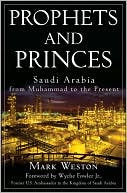by Eyck Freymann
Prophets and Princes: Saudi Arabia from Muhammad to the Present by Mark Weston
Wiley Press, 611 pages.

That said, the book had serious flaws. In neglecting to devote adequate attention to the golden years of Islamic intellectualism, the book left the religious backlash (in the form of ibn Abdul Wahhab, the man who created the modern Saudi brand of religious fundamentalism). Continued: Click "Read More"
With outside knowledge, Wahhab's radical ideas make sense. Islam's spread was unbelievably rapid: Muhammad first began to recite the Koran in 610. Only by the late 620s was Islam a coherent religion. By 630 virtually all of Mecca and Medina were converted. By 632 all of the Arabian peninsula, over one million square miles, was Muslim. Ten years later, the Persian empire (that had controlled modern-day Iraq, Kuwait, Iran, and many of the -Istans), Egypt, much of Byzantium, and much of North Africa was practicing Islam. Over the course of a decade a religious belt across Eurasia was created that was far larger than the Roman Empire.
By the mid eighth century, southern Spain had been colonized and became the center for Arab culture and learning. Scribes, writers, and scientists revolutionized medicine, astronomy, mathematics, physics, cryptology, architecture, art, and philosophy. Emissaries were dispatched as far as China and India to collect the knowledge of those cultures. Islam overtook western Europe by centuries to become the world's most vibrant intellectual culture.
It ended almost as soon as it had begun. As soon as the Muslims conquered "al-Andalus" (Spain) they faced Christian expansion from the north and social unrest within the empire. It took hundreds of years for the process to occur, but Arabs slowly retreated into the desert, abandoning most of their intellectual work.
What followed was the Dark Age of Islamic history. There was little innovation and little dissemination of ideas. This sudden fall from greatness brought about the strange brand of Islamic fundamentalism we know today. This loss of direction in a people led to the inevitable backlash.
In the study of Islam there are two lessons to be learned: that it is in itself a religion of tolerance which has been reinterpreted to completely shed its original meaning and that much of the anti-Western sentiment in the Middle East is due to the West's perceived usurpation of all things Arabic: intellectual achievements, land, and oil.
Cultural decline always leaves a vacuum. Religion is often the obvious refuge that fills the void. If American wants to make meaningful change in the Muslim world, it won't be accomplished with bombs. It will be accomplished by providing alternatives other than religious extremism: education, technology, and intellectual development.
This is my problem with Prophets and Princes. For all the talk of oil and Israel, the book does not justify the particular religious quirks that have defined Saudi Arabia through the centuries. This mutual lack of understanding, I fear, bodes ill for the future of the Middle East and our foreign policy.
Monday, November 17, 2008
Book Review: Prophets and Princes
Labels: Book Review, eyck freymann, islam, saudi arabia
Subscribe to:
Post Comments (Atom)




No comments:
Post a Comment